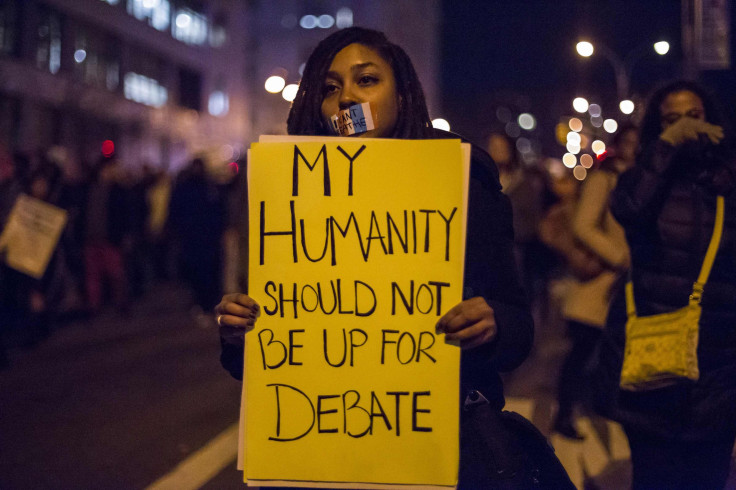Americans Agree Race Relations Have Worsened Under Obama, But They Aren't New Problems

The past three weeks have been racked with controversy and outrage, as grand juries in both Ferguson, Mo. and Staten Island, N.Y. voted to acquit police officers Darren Wilson and Daniel Pantaleo, respectively, on charges of homicide. Wilson, 28 years old and white, was involved in the shooting death of Michael Brown, an unarmed black teenager on Aug. 9. Pantaleo, 29 years old and also white, was involved in the chokehold death of Eric Garner, a 43-year-old, 400-pound unarmed asthmatic black man whose last words, "I can't breathe," were repeated 11 times. The two acquittals ignited a storm of protests calling for changes to the justice system, the way police deal with minorities, and most controversially of all, the racial divide that still exists between blacks and whites — and which many believe is getting worse.
A Bloomberg poll released Monday found that in the midst of all of this, a majority of Americans believe that race relations have “gotten worse” under President Barack Obama, the first black president. Overall, 53 percent of Americans said relations have gotten worse, while 36 percent said they’ve “stayed about the same.” Surely, the respondents, who answered questions last week, were swayed by the recent grand jury decisions — talking about race during a crisis is always harder. But there’s more to it.
Race relations are getting worse because whites and blacks (as well as Hispanics and other minorities) are seeing the same thing with two different perspectives, and the reason is poverty. Blacks and Hispanics together make up 49 percent of the population living in poverty, compared to less than 12 percent of whites. This alone divides the two groups, as those who don’t live in poverty might never understand what it’s like. But with poverty comes crime, and with crime comes more police.
“Within the African-American community, there has been an experience of disrespect, offensive language, mistreatment in terms of stops and so on. And there’s a sense that police are out to get them,” Samuel Walker, emeritus professor of criminal justice at the University of Nebraska, Omaha, told The Associated Press.
In New York City, the NYPD’s stop-and-frisk policy was found to unfairly and aggressively target blacks and other minorities. The tactic, which involved stopping residents randomly to pat them down in search of weapons or drugs, and to interrogate them on the street, was performed over five million times over the course of a decade, mostly in central Brooklyn, Harlem, and the West Bronx. Overall, 83 percent of those stopped and frisked were Hispanic or black, while only 10 percent were white. Studies have shown that stop-and-frisk as well as general racism affect black psychology, putting them at risk of post-traumatic stress disorder among other psychological traumas.
After seeing these trends, it’s obvious why minorities feel betrayed by the justice system. Yes, crime is higher in their neighborhoods, and police must take precaution when dealing with a potential (or former) criminal. But the relationship must change first, and that takes compassion and understanding.
A poll from last year found that 40 percent of white Americans were surrounded exclusively by friends of their own race. Another study from Florida State University found that many people felt interacting with another racial group was tense and awkward — it raised anxiety, making it likely they’d avoid that interaction. How can police — or any non-minority, really — understand the black community when they don’t live in it, when they don’t interact with blacks outside of work, and when they’re scared to talk to them? With more white officers than blacks patrolling black neighborhoods, this almost seems impossible. (In Ferguson, 50 of the police department’s 53 officers are white.)
This is why race relations are on the decline. After the Michael Brown shooting, 80 percent of blacks said the case raised important issues about race while only 37 percent of whites said the same, according to a Pew Research Center poll. And with many whites believing in the authority of police, it’s no wonder only 33 percent of whites, compared to 65 percent of blacks, said the shooting had gone too far. This mentality carried over to the Bloomberg poll as well, however, only in the case of Michael Brown, where 64 percent of whites said they either agreed or agreed strongly with the Ferguson grand jury, while 89 percent of blacks said they disagreed or disagreed strongly.
President Obama first addressed race with his “A More Perfect Union” speech, in which he spoke of the controversy surrounding remarks of his former pastor Reverend Jeremiah Wright. Since then, he’s weighed in on the shooting death of Trayvon Martin by saying, “When Trayvon Martin was first shot, I said that this could have been my son,” as well as both Michael Brown’s shooting and Eric Garner’s suffocation. Whether he’s responsible for this crumbling of race relations is unclear, but what is clear is that minorities around the country are looking for the first black president to work toward evening the field. Or maybe, this clash is all just a result of non-blacks believing racism is over.



























